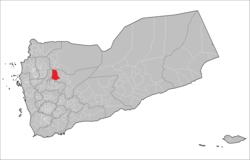Nihm District
Nihm District (Arabic: مديرية نهم) is a district of the Sana'a Governorate, Yemen. As of 2003, the district had a population of 41,502 inhabitants.[1]
Nihm District مديرية نهم | |
|---|---|
District | |
 | |
| Country | Yemen |
| Governorate | Sana'a |
| Population (2003) | |
| • Total | 41,502 |
| Time zone | UTC+3 (Yemen Standard Time) |
Climate
| Climate data for Nihm | |||||||||||||
|---|---|---|---|---|---|---|---|---|---|---|---|---|---|
| Month | Jan | Feb | Mar | Apr | May | Jun | Jul | Aug | Sep | Oct | Nov | Dec | Year |
| Average high °C (°F) | 21.6 (70.9) |
23.2 (73.8) |
24.5 (76.1) |
24.7 (76.5) |
25.6 (78.1) |
27.6 (81.7) |
26.5 (79.7) |
25.8 (78.4) |
24.9 (76.8) |
21.9 (71.4) |
19.1 (66.4) |
21.1 (70.0) |
23.9 (75.0) |
| Daily mean °C (°F) | 12.4 (54.3) |
13.3 (55.9) |
16.1 (61.0) |
16.8 (62.2) |
18.2 (64.8) |
19.1 (66.4) |
19.8 (67.6) |
19.1 (66.4) |
18 (64) |
14.5 (58.1) |
11.4 (52.5) |
12.4 (54.3) |
15.9 (60.6) |
| Average low °C (°F) | 3.3 (37.9) |
3.5 (38.3) |
7.7 (45.9) |
8.9 (48.0) |
10.8 (51.4) |
10.7 (51.3) |
13.1 (55.6) |
12.5 (54.5) |
11.1 (52.0) |
7.2 (45.0) |
3.8 (38.8) |
3.7 (38.7) |
8.0 (46.5) |
| Average rainfall mm (inches) | 7 (0.3) |
2 (0.1) |
9 (0.4) |
33 (1.3) |
38 (1.5) |
3 (0.1) |
42 (1.7) |
58 (2.3) |
5 (0.2) |
0 (0) |
6 (0.2) |
8 (0.3) |
211 (8.4) |
| Source: Climate-Data.org[2] | |||||||||||||
gollark: Also `10.0.0.0/24` but this has conflicted with some things.
gollark: My internal Wireguard LAN uses `fdfa:6c7e:ac95:aec8::/64`, for purposes.
gollark: Repeated, I think.
gollark: The coolest kids are in fact on IPv6.
gollark: As planned in general. Not necessarily by you.
References
- "Districts of Yemen". Statoids. Retrieved October 23, 2010.
- "Climate: Furdat Nihm". Climate-Data.org. Retrieved August 12, 2019.
This article is issued from Wikipedia. The text is licensed under Creative Commons - Attribution - Sharealike. Additional terms may apply for the media files.